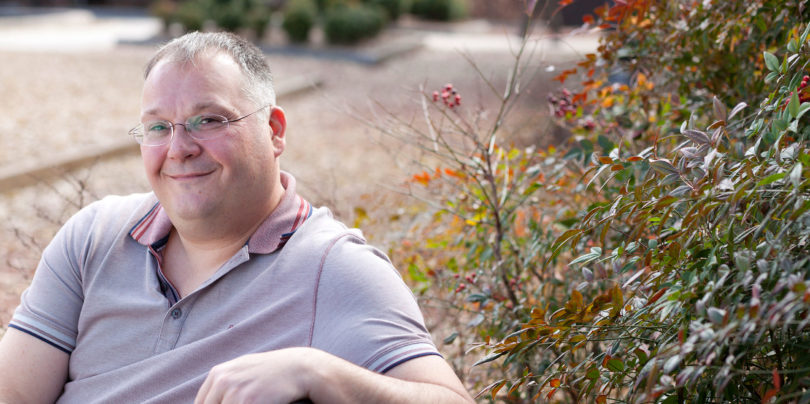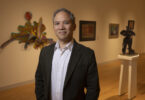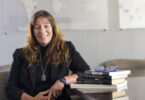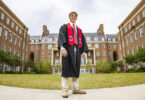Cas Mudde, an associate professor in the School of Public and International Affairs, wants his students to go beyond the viewpoint of the authors they read, and the professor that teaches them, and make up their own mind—as long as it is informed by facts and not fiction or prejudice.
Where did you earn degrees and what are your current responsibilities at UGA?
I earned both my master’s degree and Ph.D. at Leiden University in the Netherlands, where I was born and raised. I am currently an associate professor in the department of international affairs. I serve on the graduate admission committee of our Ph.D. program and on the international programs committee of the School of Public and International Affairs.
When did you come to UGA and what brought you here?
I came to UGA in August 2012, after one year at the University of Oregon and three years in Indiana at Notre Dame and DePauw University. Before coming to the U.S. in 2008, I taught for 10 years at universities throughout Europe, including in Belgium, Hungary and Scotland. What brought me to UGA? My wife, the weather and the campus. I met my wife while I was working in Antwerp, Belgium, and she was finishing her Ph.D. at Emory in Atlanta. We agreed that I would follow her to the U.S. and she would follow me within the U.S. However, our dream was to go either back to the New York/New Jersey area (she is originally from Queens, New York, and I was a Fulbright EU Scholar-in-Residence at Rutgers University in 2006) or to Georgia, as we both loved the local climate and the city of Atlanta. During a trip to Athens I fell in love with both the town and the university campus, so when a position was advertised for a job at UGA I jumped at the opportunity.
What are your favorite courses and why?
Generally I love to teach courses that can easily be linked to current events, as that makes the students more interested and makes it easier for me to explain conceptual and theoretical issues. For example, in Maymester 2014 I taught a course on the European Union that analyzed the results of the European elections that were held that month. I also really enjoy teaching the graduate course on qualitative methods in international affairs because I can provide them with a different outlook on the social sciences, which is invaluable for their dissertation research. My favorite course, however, is “Film, Politics and Literature,” which I taught for the first time last year. I have been amazed by how strongly students respond to, in particular, non-American movies. The act of “viewing” rather than only reading a text seems to make it much easier for them to gain an understanding in phenomena and worlds they have never experienced or visited.
What interests you about your field?
That’s actually a very difficult question for me to answer. I find politics fascinating to study but am not attracted to the practice of it. Politics is essentially about power, which fascinates me. Why do people do what they do? And, particularly, why do they do things that seem to go against their own interests? My specific interest in issues of extremism and democracy is undoubtedly related to growing up in the Netherlands of the 1970s and 1980s, which was still very much influenced by legacies of the second world war in general and the Holocaust in particular. My high school history classes were almost exclusively focused on those five years in the 20th century, which were covered much more extensively than, for example, the so-called “Golden Age,” roughly the 17th century, during which the Netherlands was the leading country in the world. The pure black-and-white presentation of the second world war and fascism was extended to the so-called “extreme right” in the post-war era, which was seen as a major threat, despite being politically marginal. This disproportional fear, which led in my opinion to undemocratic responses, has profoundly influenced my academic interests.
What are some highlights of your career at UGA?
As I am only in my third year here, most of my highlights are hopefully still ahead of me. Obviously, getting tenure was a highlight, even though I effectively held a tenured position in Europe between 2005 and 2010, when I gave it up to come to the U.S. But seeing all my colleagues and their partners come out for the surprise party to celebrate my tenure was definitely a highlight. I guess other highlights were being appointed co-editor of the European Journal of Political Research, the primary political science journal in Europe,and being the most cited UGA faculty member in the media in April 2014. Still, the main highlights are the undergraduate students, who are truly a delight to teach. Not only do we have particularly smart and well-prepared students in the department of international affairs—of whom the best are nationally recognized—but they are, on average, quite engaged and open and willing to be challenged, despite coming from a background that emphasizes a more passive and top-down approach to education.
How does your research or scholarship inspire your teaching, and vice versa?
I try to draw upon my research as much as possible in my teaching. Obviously, this is the strongest in my course on the far right in Western democracies, in which I draw heavily upon my own research and writings. I also tend to share a lot of my own research experiences in my graduate course on qualitative methods, which I hope helps the students understand that research is an iterative process that involves falling and getting back up multiple times. In all my courses I draw upon my own research to give concrete examples of more abstract moral and theoretical questions. For the same purpose I often include personal references to provide some real-life detail to the academic topics. Having lived in many European countries, and visited most others, allows me to almost always come up with some “fun facts’ that serve as icebreakers to a new topic and provide some extra context to an unknown land.
What do you hope students gain from their classroom experience with you?
I hope that they gain an independent, intellectual position on the topic at hand, which they have developed on the basis of a critical evaluation of both the course readings and the class discussions. I want them to go beyond the viewpoint of the authors they read, and the professor that teaches them, and make up their own mind, as long as it is informed by facts and not fiction or prejudice. The biggest compliment is not necessarily “I learned so much in your course,” although that is also appreciated, but rather “Your course gave me a completely different perspective.” I am here to rock their old world, but it is mostly up to them to develop their new world.
Describe your ideal student.
My ideal student is critical, curious, inquisitive, intelligent, responsible and self-motivated. I love students who are in my course because they want to learn, rather than to get a certain grade. I also appreciate students who question their readings and who question me, as long as they have a more or less convincing argument why they do so. Blindly questioning authority is as annoying as blindly following authority.
Favorite place to be/thing to do on campus is…
I love to sit or lie on Herty Field and read or grade. It is one of the most beautiful spots on the whole UGA campus and, just like the rest of North Campus, it is a spot where students and nonstudents come together and where local families bring their kids to play.
Beyond the UGA campus, I like to…
… hang out at Walker’s, read at Hendershot’s or Sips, go to concerts at the Georgia Theatre and the Caledonia, see a movie at Ciné, and eat at Cali N Tito’s and Yummy Pho.
Favorite book/movie (and why)?
“Siddhartha” by Herman Hesse is probably still my favorite high-brow literature book, as it shows both the importance of constant reflection on your life and the futility of trying to pre-empt the future. “The Miracle of Castel di Sangro: A Tale of Passion and Folly in the Heart of Italy” by Joe McGinniss is definitely one of my favorite low-brow literature books. It combines my passion for the interplay of culture and football (or, if you wish, “soccer”) as well as my fascination with the absurd. My all-time favorite movie, however, is “Apocalypse Now” by Francis Ford Coppola. It is the perfect combination of amazing characters, classic one-liners (“Charlie don’t surf!”), fascinating sceneries, mesmerizing atmosphere, profound social critique and a thrilling storyline. Pure brilliance.
Proudest moment at UGA?
I guess my proudest moment was when I came into my spring 2013 “Comparative Public Opinion and Participation” class and found an anonymous card from some of the students, who, in a tongue-and-cheek way related to the topic of the course, thanked me for the nice course so far.
Originally published 11/30/14








